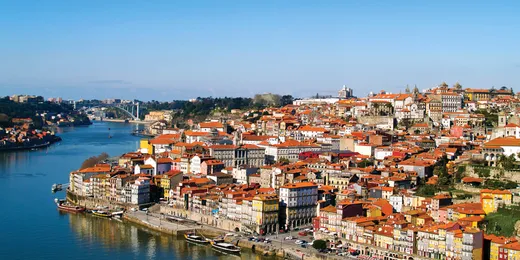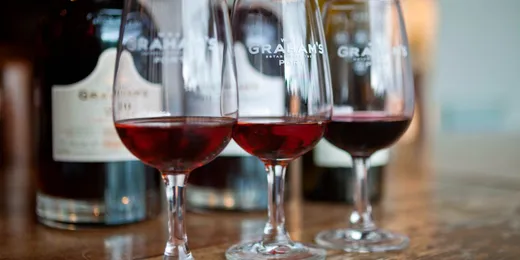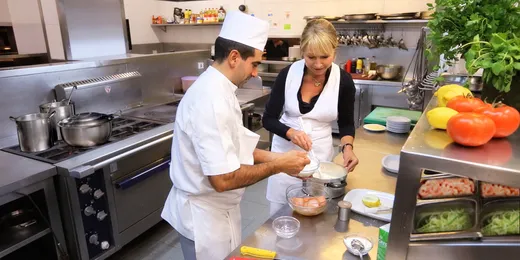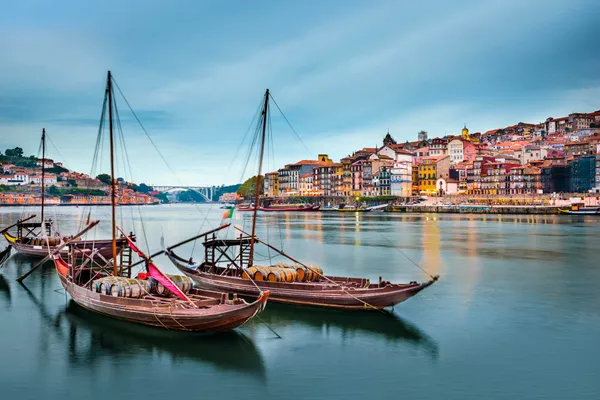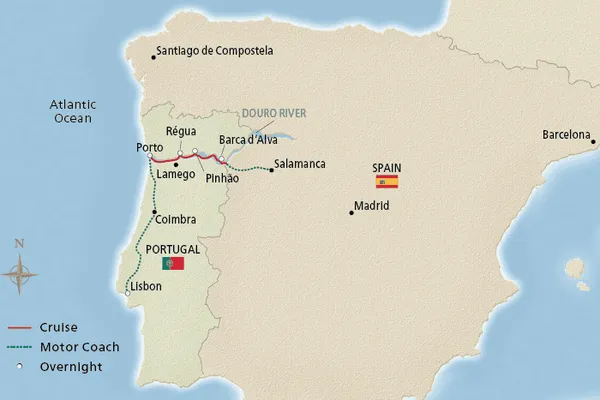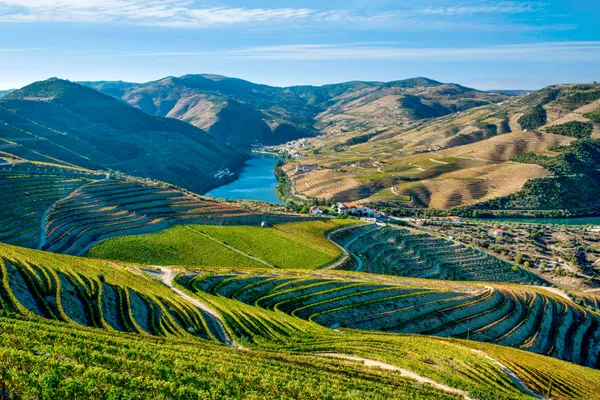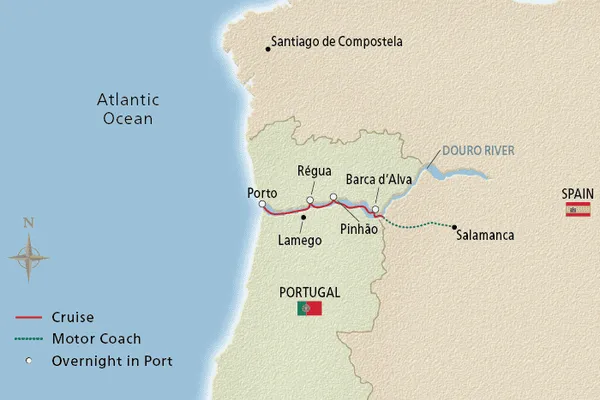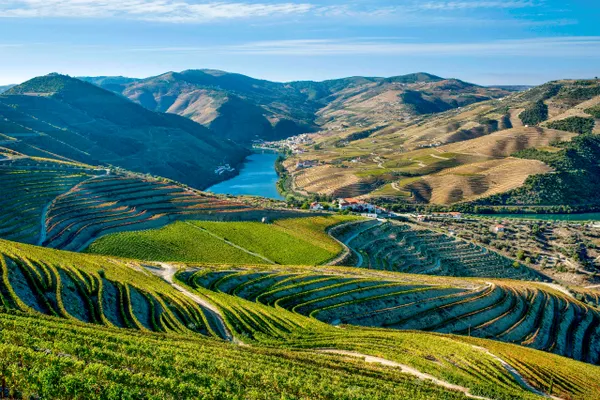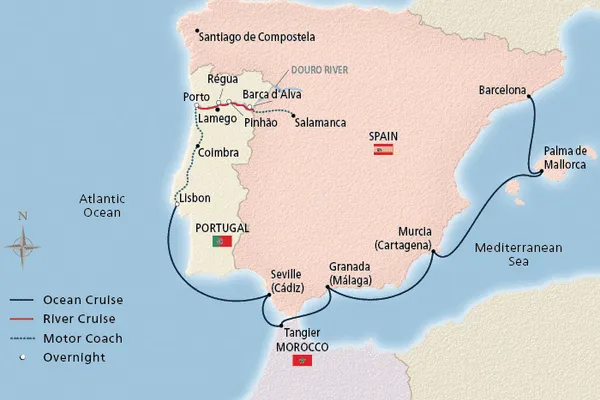
Set sail along the Douro River
Discover the picturesque beauty of Portugal’s Douro River Valley from the unique vantage point of its tranquil waters. With picturesque terraced vineyards and charming villages, this breathtaking region is sure to delight. Read on to learn more about Portugal’s most famous rosé, explore the captivating Museu do Douro and enhance your knowledge of cork production.

Douro
On a journey spanning 557 mi. (896 km), the Douro River begins its leisurely course in north-central Spain, passing ancient towns and navigating narrow canyons to reach the border of Portugal. There is a train that follows the Douro along the majority of its spectacular route, but it is only by traveling on the river itself that you can fully appreciate the mighty landscapes that the water has carved out over time.
Once in Portugal, the river winds its way through historic cities and towns like Porto, Régua and Pinhão. Many of the notable buildings that line the riverbank around Porto’s historic center have connections with the great wine-producing industry that is at the very heart of the Douro Valley. Wine has been produced in the area for more than 2,000 years, but it was not until 1756 that the industry became organized and internationally recognized. Further evidence of the wine trade’s dominance in these parts can be found across the river from Porto—in the city of Vila Nova de Gaia, which is home to the famous port wine cellars.
Farther upstream in the Alto Douro Wine Region, recognized by UNESCO in 2001 as a World Heritage Site, winding roads pattern the landscape, leading up to wonderfully lush vineyards in which many grapes are still picked by hand and crushed by foot. Gleaming white quintas, or wine estates, are visible from the river and offer a tempting glimpse of a traditional way of life that has existed for centuries.
Situated in the demarcated Douro Region, in the charming vineyard town of Favaios, Quinta da Avessada is an ancient site that has long produced one of the richest wines of the Douro region. The area’s famous port wine has been cultivated for more than 300 years, beloved for its characteristic full-bodied sweetness. According to the guidelines established by the European Union’s Protected Designation of Origin, only wine produced in the Douro Valley may be labeled “port” or “porto” (although this is not required in the US).
The Douro River region is home to more than just people. Over the centuries, the river has carved magnificent gorges into the Portuguese landscape near the Spanish border. These steep banks, known as arribas, provide a haven for all sorts of wildlife that live off the river’s ecosystem. Golden and Bonelli’s eagles, black storks, and Griffon and Egyptian vultures can be seen soaring through the air or keeping watch from nests built high in the rocks along the hillsides. On the ground, endangered Iberian wolves roam the land, keeping the wild boar population in check, while wildcats search for grouse or rabbits and deer and ibex forage in the forests.

-
Cuisine—Mateus Rosé
Anyone who drank wine in the 1960s, ’70s or ‘80s probably enjoyed at least a glass or two of one of Portugal’s easy-drinking exports, Mateus Rosé. Created in 1942 during the height of World War II, Mateus founder Fernanco van Zeller Guedes combined Portuguese vinho verde grapes with French wine-making techniques to produce a rosé that was slightly bubbly, delicately sweet and pinkish in hue.
This popular wine was originally crafted to suit Brazilian tastes, as exports to Europe were disrupted by German U-boats in the Atlantic. The sparkling nature provided crossover appeal that captured beer and soda drinkers as well as wine enthusiasts. By the late 1980s, bolstered by the introduction of a white wine version, Mateus accounted for over 40 percent of Portugal’s table wine exports and achieved global sales of more than three million cases per year.
One of the hallmarks of Mateus, and undoubtedly a major contributor to its worldwide success, is its depiction of an opulent estate entitled “Palacio de Mateus” on its label. In truth, the building in question, which is located in Vila Real, has never played a material role in the wine’s production and is not technically a palace. According to Portuguese law, a building may be deemed a “palace” only if a member of the sovereignty has spent at least one night on its premises. The house was built during the first half of the 18th century by António José Botelho Mourão, and his descendants still live there today.
To legally use the estate’s likeness on Mateus labels, Guedes offered the owners a choice: they could receive either a small royalty on every bottle sold or a lump sum paid up front. Their decision to accept the latter option is widely considered one of the greatest mistakes in the history of both business and wine. According to Oz Clarke’s The History of Wine in 100 Bottles, it is “still not a subject to be brought up in conversation.”
The Mateus brand may not be as famous now as it was in its heyday, but it has enjoyed a revival since the turn of the millennium thanks to a relaunch and a subtle adjustment to the original recipe that made it slightly drier and therefore more appealing to modern palates. Despite the flavor changes, the wine is still sold in its distinctive narrow-necked, flask-shaped bottle—inspired by the water flasks traditionally worn on the hip by Portuguese soldiers during World War I—complete with the iconic Palacio de Mateus label and a real cork stopper.
-
Culture—Museu do Douro
The Museu do Douro (Douro Museum), located in the peaceful town of Régua, provides an insightful look into Portugal’s Douro wine region. Since its founding, the museum has earned praise for its commitment to preserving the Douro’s distinctive culture and heritage. Fittingly, it occupies the former headquarters of the General Company of Agriculture and Alto Douro Vines (1756–1863), the organization that established the Douro as the world’s first demarcated wine region.
The three-story building, reminiscent of a farmhouse and designed in the Pombaline architectural style, originally served many purposes. These included administrative and judicial functions, including developing and regulating the production and marketing of the region’s wine. Here, the company’s employees and winemakers who made the trek to Régua for its annual wine fair could also find lodging. Wine was even made and stored on-site.
Today, the first floor that was used for wine storage holds the museum’s permanent collection showcasing various artifacts, wine labels and artwork. Once reserved for meetings, wine exhibitions and court proceedings, the second floor contains a wine bar and restaurant in what was formerly a wine-tasting room and kitchen, respectively.
-
Nature—Portuguese cork
The next time you hear the satisfying pop of a cork leaving a bottle, remember that it was probably made in Portugal. Nearly half of the world’s cork production hails from this bountiful country, and cork alone accounts for a substantial share of Portugal’s total foreign income derived from trade. Its three primary consumer markets are the US, the UK and Germany, which together absorb about 70 percent of the total.
This remarkable material originates from the cork oak tree, which has developed its signature thick layer of bark over time as an adaptation to southwestern Europe’s long history of drought, bush fires and temperature fluctuations. This tree covers a significant portion of Portugal’s landscape and makes up more than a quarter of its forests. Cork is astonishingly lightweight, with 50 percent of its volume consisting of pure air. It is the only readily available solid on Earth that, when compressed on one side, does not increase in volume on the other. It is also elastic, waterproof, fire-retardant and abrasion resistant. However, its most noteworthy property is its renewability.
It takes about 25 years for a cork oak tree to be ready for harvesting. After that, the bark can be collected again every nine years. This is due to the fact that cork naturally regenerates, so one tree can produce a lifetime of harvests. Since some trees live up to 150 years, it is little wonder that cork plays such a vital role in Portugal’s economy.
Cork harvesting is a highly specialized craft. Two cork strippers work in tandem, carefully chopping and peeling the bark from the tree’s trunk. The process remains entirely manual, relying on a steel axe that harvesters use to measure the bark’s thickness, listening for the sound it produces. Due to the skill and precision involved, cork harvesting is the highest-earning sector of Portugal’s agricultural industry.
From fishing boats to floor tiles, durable cork has served many purposes over the centuries, even providing ship-building materials for the vessels used by Portuguese explorers during the Age of Discovery. Nevertheless, it was an Englishman, Robert Hooke, who discovered that cork provides the perfect seal for wine bottles—surely an idea worthy of a toast.
Douro Highlights
Cruise through the Douro River Valley, the world’s oldest demarcated wine region, and immerse yourself in Portugal’s stunning landscapes and rich cultural traditions. Here are some highlights you may experience as you sail along the “River of Gold”:
- Explore Porto’s UNESCO-listed city center
- Listen to the soulful melodies of fado music
- Visit Coimbra, Portugal's oldest university town
- Tour the 14th-century Santa Maria da Vitoria Monastery
- Sample award-winning port wines
- Discover the extraordinary Mateus Palace
- See traditional Portuguese tiles in charming Pinhão
- Journey through the stunning Alto Douro Wine Region
- Walk the winding lanes of charming Marialva
- Wander through Castelo Rodrigo, a 16th-century village
Destination Insight Videos
-
Portugal’s Wine Country (3:06)
In 1756, Portugal’s Douro River Valley became the world’s first protected wine-producing region, and today is a UNESCO World Heritage Site. Learn more about the region’s famous port wine.
-
History of Port Wines (3:58)
Take a journey with Karine as she explores Portugal’s history of wine and gains insight into its production and the various types of port, with a local expert on hand.
-
Fado, Music of Portugal (2:36)
Learn about the dramatic songs of fado, born along Portugal’s waterfront. This music of passion often depicted the longing of women waiting for their men to return from sea.
-
Portuguese Crème Brûlée (3:07)
Go behind the scenes with Karine to see how easy it is to make this local variation of everyone’s favorite dessert. You may want to take notes during this hands-on demonstration!
Douro Travel FAQ
Enriching Itineraries—Douro
Choose one of our immersive voyages and discover the many benefits of exploring in Viking comfort.



